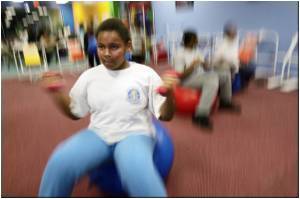Exercise was found to play an important role in helping kids cope with stress, finds study published in JCEM.

"The findings suggest physical activity plays a role in mental health by buffering children from the effects of daily stressors, such as public speaking," said the study''s lead author, Silja Martikainen, MA, of the University of Helsinki, Finland.
The cross-sectional study monitored physical activity and cortisol levels in a birth cohort of eight-year-old children. The 252 participants wore accelerometer devices on their wrists to measure physical activity. Saliva samples were taken to measure cortisol levels. To measure reactions to stress, children were assigned arithmetic and story-telling tasks. The study is the first to find a link between physical activity and stress hormone responses in children.
The children were divided into three groups - most active, intermediate and least active. The most active children''s cortisol levels were the least reactive to stressful situations. The most active children exercised more vigorously and for longer periods of time than their counterparts.
"Clearly, there is a link between mental and physical well-being, but the nature of the connection is not well understood," Martikainen said. "These results suggest exercise promotes mental health by regulating the stress hormone response to stressors."
Other researchers working on the study include: A. Pesonen, J. Lahti, K. Heinonen, K. Feldt, R. Pyhälä and K. Räikkönen of the University of Helsinki; T. Tammelin of LIKES Research Center for Sport and Health Sciences; E. Kajantie and J. Eriksson of the National Institute for Health and Welfare; and T. Strandberg of Helsinki University Central Hospital.
Advertisement
Source-Newswise














